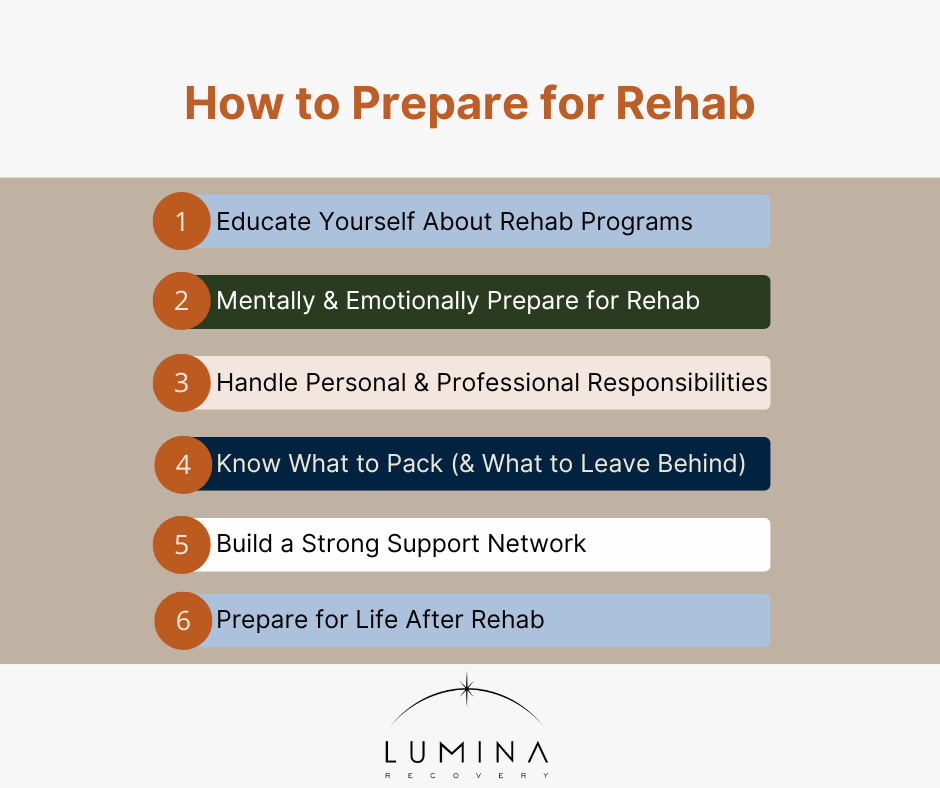Deciding to go to rehab is a monumental step toward reclaiming your life from addiction. It’s a time filled with hope, but it can also bring uncertainty and anxiety. You may have questions about what to do before going into rehab, how to check into rehab, and how to ensure you’re setting yourself up for success.
This guide will help ease your concerns by covering essential steps to prepare for rehab—mentally, emotionally, and logistically. By taking these steps in advance, you can focus fully on your recovery once you begin treatment.

1. Educate Yourself About Rehab Programs
Before going to rehab, familiarize yourself with the different types of treatment programs available.
Understand Treatment Options
- Detox programs help remove substances from your body under medical supervision.
- Inpatient rehab provides 24/7 care in a structured environment.
- Outpatient treatment allows flexibility while receiving therapy and support.
- Medication-assisted treatment (MAT) uses FDA-approved medications to aid recovery.
- Dual Diagnosis Treatment addresses co-occurring mental health conditions alongside addiction.
Research Your Facility
Every rehab center offers different programs and approaches. Research facilities to find the one that aligns with your needs. Reading reviews, asking for referrals, and speaking with admission counselors can help guide your decision.
2. Mentally and Emotionally Prepare for Rehab
Entering rehab is a significant life change, and preparing yourself mentally and emotionally can make the transition smoother.
Accept the Process
Success in rehab starts with the right mindset. Acknowledge that recovery is a journey, not a quick fix. Understand that challenges will arise, but facing them with determination will help you grow. Accepting that rehab is a tool for transformation can make the process easier.
Coping With Pre-Rehab Anxiety
It’s natural to feel apprehensive before going to rehab. Consider using mindfulness techniques like meditation, deep breathing, or journaling to process your emotions. Therapy sessions before rehab can also provide valuable support in preparing for this life-changing experience.
Set Realistic Goals
Establish personal goals for your rehab journey. These could include:
- Learning healthier coping mechanisms
- Strengthening your emotional resilience
- Building a support network for post-rehab success
By setting goals, you’ll have a clear focus that keeps you motivated during treatment.
3. Handle Personal and Professional Responsibilities
Before entering rehab, it’s important to ensure your personal and professional obligations are in order so you can focus entirely on your recovery.
Work and Financial Planning
Inform your employer about your rehab stay. Many workplaces offer leave policies for medical treatment, including addiction recovery. If necessary, delegate responsibilities to a trusted colleague.
To ensure financial stability while you’re in rehab, set up automatic bill payments or designate a trusted family member to manage your finances.
Family and Dependents
If you have children, pets, or other dependents, arrange for their care ahead of time. This might involve:
- Coordinating with a partner, family member, or trusted friend
- Exploring temporary childcare options
- Making arrangements for pet care
Legal Considerations
If you have pending legal matters, address them before entering rehab. This may include arranging power of attorney, custody agreements, or other essential legal documentation.
4. Know What to Pack (and What to Leave Behind)
Each rehab facility has different guidelines on what you can and cannot bring. However, here are some general guidelines:
Essentials to Bring
- A valid ID and insurance information
- Comfortable, season-appropriate clothing
- Approved prescribed medications (with original labels)
- Toiletries (alcohol-free, if required by the facility)
Optional Items
- A journal for personal reflections
- Family photos for emotional support
- Approved books or reading materials
Prohibited Items
- Drugs, alcohol, or any substance not approved by the facility
- Weapons or other dangerous objects
- Unapproved electronics (many rehabs restrict phones and laptops to minimize distractions)
5. Build a Strong Support Network
Recovery is easier when you have a strong support system in place.
Inform Loved Ones
Let close family and friends know about your decision to check into rehab. Their support will be crucial during and after treatment. Open communication can help ease concerns and encourage positive reinforcement.
Join Recovery Groups
Even before going to rehab, you can start engaging with recovery communities. Consider attending 12-step meetings or joining online support groups to connect with others on a similar path.
Set Communication Expectations
Rehab programs may have communication restrictions, such as limited phone or internet access. Inform your loved ones about these policies and establish expectations for staying in touch.

6. Prepare for Life After Rehab
Successfully completing rehab is a major achievement, but the journey to lasting sobriety continues beyond treatment. Planning for life after rehab ensures you have the support and resources necessary to maintain your progress.
Research Outpatient and Aftercare Support
Recovery doesn’t end after rehab. Before you go to rehab, research outpatient programs, support groups, or sober living options. Having a plan for ongoing care can help ease the transition back to daily life.
Identify Triggers
Reflect on situations, environments, or emotions that may lead to cravings. Work with a therapist to develop coping strategies that will help you maintain long-term sobriety.
Explore Continued Therapy Options
Consider post-rehab therapy options such as:
- Cognitive behavioral therapy (CBT) helps address thought patterns that contribute to addiction.
- Dialectical behavior therapy (DBT) enhances emotional regulation and mindfulness.
- Family therapy strengthens relationships and improves communication with loved ones.
- Group therapy builds a supportive network with others in recovery.
Frequently Asked Questions (FAQs)
How do you get into rehab?
To get into rehab, start by researching treatment centers that fit your needs. Reach out to the facility to discuss your situation, verify insurance, and complete any necessary pre-admission requirements. Some people may need a referral from a doctor or therapist, while others can self-enroll.
What do you bring to rehab?
Your specific facility will advise you on what to bring to rehab. This may include essential items such as identification, insurance information, prescribed medications, toiletries, and comfortable clothing. Optional items may include a journal, family photos, and approved reading materials. Leave behind any prohibited items such as unapproved electronics, drugs, alcohol, and weapons.
How do you check yourself into rehab?
Knowing how to check yourself into rehab involves selecting a facility, verifying your insurance or arranging payment, and completing an intake assessment. Once the logistics are settled, you’ll set a date to enter the program and begin your treatment journey.
What can you go to rehab for?
Rehab centers treat various substance use disorders, including alcohol, opioids, cocaine, methamphetamine, and prescription drugs. Many facilities also offer treatment for co-occurring mental health conditions such as anxiety, depression, and PTSD.
A Fresh Start Begins With Lumina Recovery
Preparing for rehab may feel overwhelming, but taking proactive steps will help you enter treatment with confidence. From managing responsibilities to packing the right essentials, every step you take now will make your journey smoother.
At Lumina Recovery, we provide comprehensive support through detox programs and residential inpatient treatment, ensuring a structured and effective recovery process.
If you’re ready to take the next step and learn how to go to rehab, contact us today for expert guidance and compassionate care.


